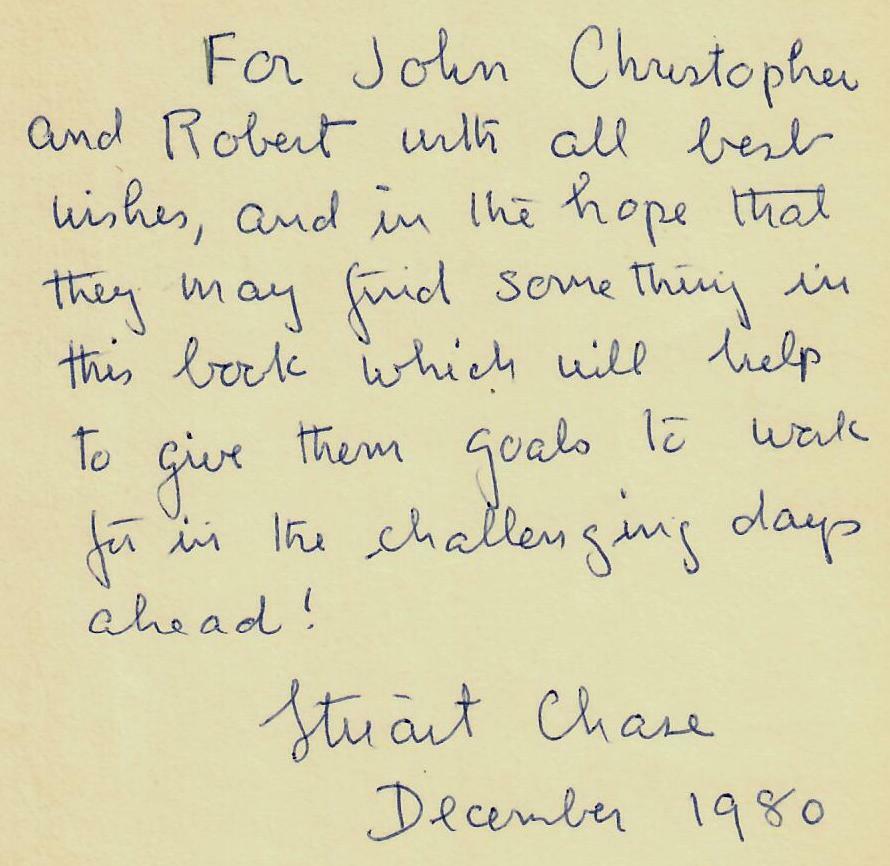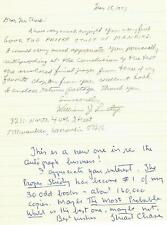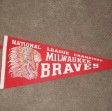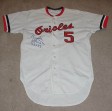When you click on links to various merchants on this site and make a purchase, this can result in this site earning a commission. Affiliate programs and affiliations include, but are not limited to, the eBay Partner Network.
Up for sale a RARE! "Economist" Stuart Chase Hand Written Letter Dated 1980.
ES-8759E
Stuart Chase (March 8, 1888 – November 16, 1985) was an American economist, social theorist, and writer. His writings covered topics as diverse as general semantics and physical economy. His thought was shaped by Henry George, by economic philosopher Thorstein Veblen, by Fabian socialism, and by the Communist social and educational experiments being in the Soviet Union around 1930. Chase spent his early political career supporting "a wide range of reform causes: the single tax, women's suffrage, birth early books, The Tragedy of Waste (1925) and Your Money's Worth (1928), were notable for their criticism of corporate advertising and their advocacy of consumer protection. In 1929 Chase co-founded Consumers' Research, a consumer protection advocacy organization. Chase was born in Somersworth, New Hampshire, to public accountant Harvey Stuart Chase and Aaronette Rowe. His family had been living in New England since the 17th century. He attended the Massachusetts Institute of Technology from 1907 to 1908 and graduated from Harvard University in 1910 as a public accountant. After graduating, Chase became part of his father's accounting firm in Boston. Chase married Margaret Hatfield in 1914 and had two children, Sonia and Robert. He and Margaret were divorced in 1929, and one year later, he married Marian Tyler, a violinist and staff member at The Nation who collaborated with him on several of his books; she survived him by three and a half years. In 1917, Chase left accounting and took a position with the Food Administration of the Federal Trade Commission in Washington, D.C.. In the commission, Chase conducted investigations on waste and corruption, one of them being the meatpacking industry with Upton Sinclair. In 1921, Chase joined, along with economic philosopher Veblen, the Technical Alliance, which later became Technocracy Incorporated, part of the Technocracy movement. Chase also worked with the Labor Bureau, an organization that provided services for labor unions and cooperatives. In 1927, Chase wrote Your Money's Worth, discussing advertisements that promise but fail to deliver products as advertised to customers who order them. In 1927, Chase traveled to the Soviet Union with members of the First American Trade Union Delegation and was the co-author of a book that praised Soviet experiments in agricultural and social management. In 1932, Chase wrote A New Deal, which became identified with the economic programs of American President Franklin Roosevelt, a phrase that he and socialist Florence Kelley gave to Roosevelt, which he used in his first presidential campaign agenda. He also wrote a cover story in The New Republic, "A New Deal for America," during the week that Roosevelt gave his 1932 presidential acceptance speech promising "a new deal. However, whether Roosevelt speechwriter Samuel Rosenman saw the magazine is not clear. Chase's 1938 book The Tyranny of Words was an early (perhaps the earliest, predating S. I. Hayakawa) and influential popularization of Alfred Korzybski's theory of general semantics. Chase supported United States non-interventionism and was against U.S. entry in World War II, advocating this position in his 1939 book The New Western Front. After the war, Chase became involved in social science. In 1948, he published The Proper Study of Mankind in which he introduced the social sciences to several college campuses. In a 1952 article, "Nineteen Propositions About Communism," Chase criticized the government of the Soviet Union, stating that its citizens, trade unions and farmers "had no power" despite the claims of Communist supporters. Chase also dismissed the Communist Party USA as "our minuscule menace" whose members consisted of "a high proportion of frustrated neurotics and plain crackpots as well as some high minded-idealists — a tragic group, this last." Chase also quoted Herbert Philbrick to the effect that "the McCarthyites and demagogues... make the work of the FBI more difficult by confusing the innocent with the guilty." In the 1960s, Chase lent his support to the Lyndon Johnson administration's Great Society policies. Chase died in Redding, Connecticut.










